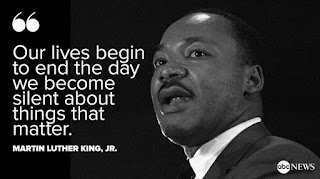 |
| A misquote via Tweet from ABC News, I explain it below. Source: Snopes.com |
Topics: Commentary, Climate Change, Existentialism, Politics, Science
Though I attended an evening service by my church's Black History Group last Sunday, and I am attending a breakfast with my fraternity brothers today, Dr. Martin Luther King Jr. did NOT actually say the following (it's paraphrased):
"Our lives begin to end the day we become silent about things that matter."
It's a great quote, and obviously passed around quite a bit on social media - in ABC News' case, mainstream media. It's even attributed to him on Brainy Quote and Good Reads, but Snopes scores it a mixture and gives the full context of what he originally said and a fair synopsis of how it was contracted (see the excerpt below).
There are people that matter; things that matter (like the PLANET), such as we've experienced the third year of increasing temperatures likely to be followed by related storm activity in the form of hurricanes, flooding; tornadoes. There will of course be the associated property damage and loss of life. Scientific American also talks about it here. For a republic to STAND, we have to abide by a certain number of measurable data points of observation and experiment from reality to begin a conversation. We also have to learn the difference between scientific theory and a cliched expression.
An excerpt from his sermon after "Bloody Sunday" on the Edmund Pettus Bridge:
A man might be afraid his home will get bombed, or he's afraid that he will lose his job, or he's afraid that he will get shot, or beat down by state troopers, and he may go on and live until he's 80. He's just as dead at 36 as he would be at 80. The cessation of breathing in his life is merely the belated announcement of an earlier death of the spirit. He died...
A man dies when he refuses to stand up for that which is right. A man dies when he refuses to stand up for justice. A man dies when he refuses to take a stand for that which is true.
..."that which is true."
We are supposedly in a post-truth world, but I'm now sincerely doubting that. No mountainous mendacity; no stupendous obfuscation can convince a made-up human mind that has critical thinking faculties, wit and abiding curiosity. Such beings will always dig a little deeper. A news feed with actual sources can change many other minds, or at least point them in the right direction to ask further questions.
Despite the fact the quote in the photo above SOUNDS like something Dr. King might have said, I merely probed a little more and found the possible origins and history behind the paraphrase. It did not lessen my admiration for Dr. King in the slightest and what he accomplished for all of us in this nation, but it did give context, history and deeper meaning (and, I still like the quote).
May we all take a stand for "that which is true": actual, verifiable scientific FACTS, and face courageously the factions of trolls that will attempt to gaslight us all as a democratic republic away from them. They are our metaphorical fire hoses.
What is to be admired by Dr. Martin Luther King Jr. and Congressman John Lewis is those weren't just the words of a clever sermon: it might as well have been a police blotter, a report like so many others of so many bruised, battered, bitten and fire-hosed bodies that stood up with their backs straightened, and took blows for "that which is true," forcing our nation to live up to its own ideals... those which ultimately matter.
“The good thing about science is that it's true whether or not you believe in it.”
― Neil deGrasse Tyson
“The Seven Social Sins are:
Wealth without work.
Pleasure without conscience.
Knowledge without character.
Commerce without morality.
Science without humanity.
Worship without sacrifice.
Politics without principle.
From a sermon given by Frederick Lewis Donaldson in Westminster Abbey, London, on March 20, 1925.”
Comments